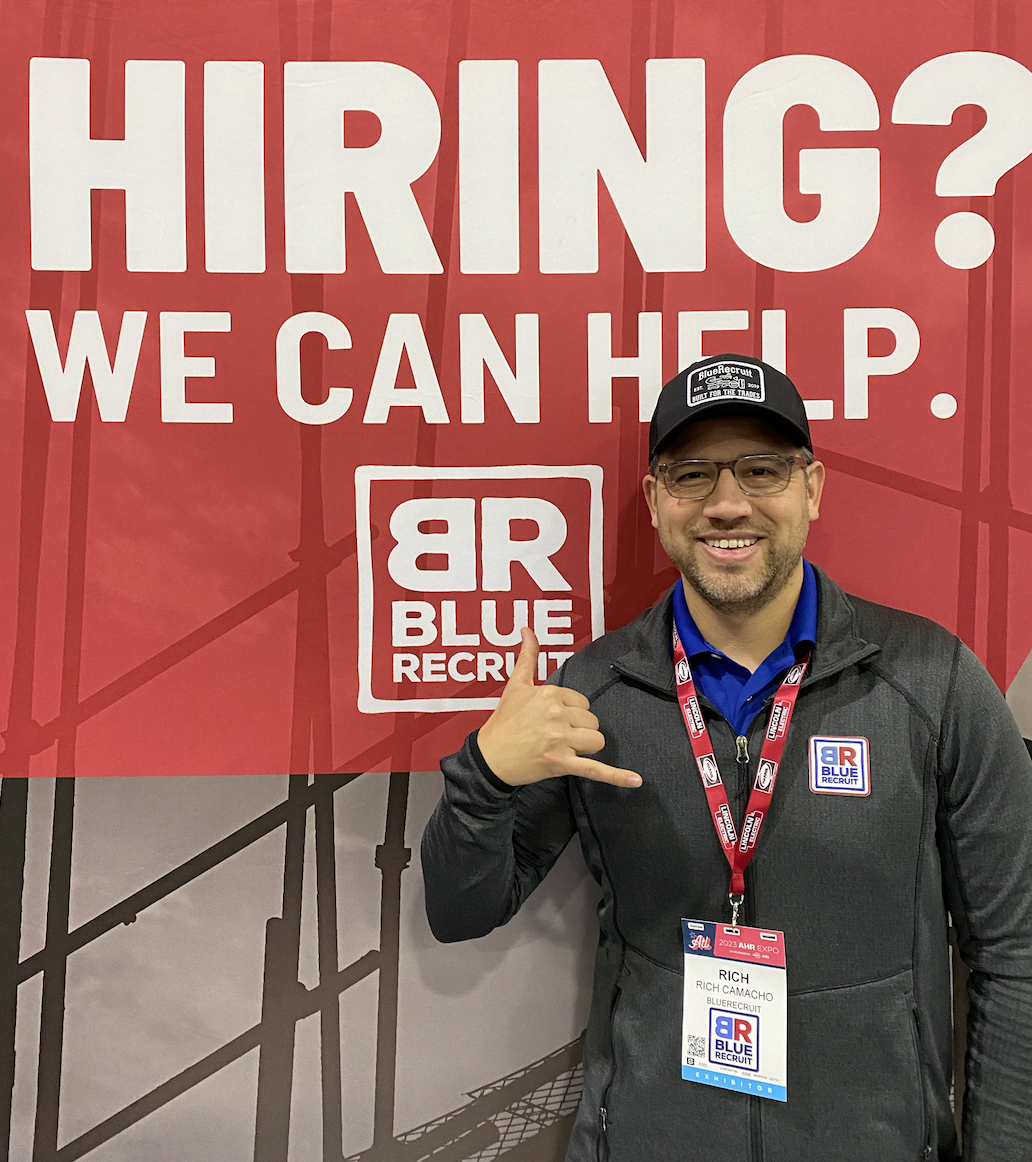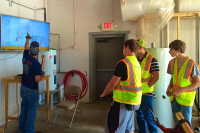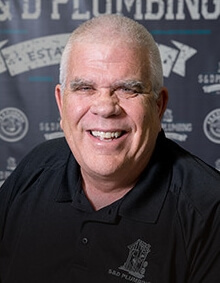Mechanical Hub recently talked with Rich Camacho, CEO, Blue Recruit, about the hiring of qualified candidates to potential trade jobs. Blue Recruit is a company that provides skilled workers with a revolutionary path to success. While that mission is straightforward, reaching that goal requires tremendous collaboration between industry, educational systems and supporting organizations. Here is Read more
skilled labor

Mechanical Hub recently talked with Rich Camacho, CEO, Blue Recruit, about the hiring of qualified candidates to potential trade jobs. Blue Recruit is a company that provides skilled workers with a revolutionary path to success. While that mission is straightforward, reaching that goal requires tremendous collaboration between industry, educational systems and supporting organizations. Here is our discussion with Rich:
MH: What do you think the industry (PHVAC) can be doing better to recruit more to the trades?
CAMACHO: An issue we hear constantly amongst PHVAC companies, to a far greater extent than any other trade, is the idea that their company is “different.” I don’t know if it is a culture issue within PHVAC or a lack of competitor awareness, but many PHVAC owners have this misguided belief that the services they provide are more complicated than their competitors and thus must only hire highly experienced technicians and installers. Guess what, 95% of y’all provide the exact same services as the other five shops in your town and you are all fighting over the same technician or plumber that has seven years under their belt.
 The insistence that you can only hire extremely experienced workers is a major hurdle to growth. Too often people complain “young people don’t want to work,” “they’re lazy,” “they are avoiding the trades to be social media influencers,” etc. Well, guess what? When you refuse to even interview someone trying to launch their skilled trades career, you become a major part of the problem. That business owner needs to remember that they were once a brand-new Apprentice, and someone took the time to train them. We will never train the trades’ next generation if we do not give them the opportunity to get started.
The insistence that you can only hire extremely experienced workers is a major hurdle to growth. Too often people complain “young people don’t want to work,” “they’re lazy,” “they are avoiding the trades to be social media influencers,” etc. Well, guess what? When you refuse to even interview someone trying to launch their skilled trades career, you become a major part of the problem. That business owner needs to remember that they were once a brand-new Apprentice, and someone took the time to train them. We will never train the trades’ next generation if we do not give them the opportunity to get started.
MH: Piggybacking off of this, how do we do a better job highlighting pay, lifestyle, for example, as huge positives while reducing the negative stereotypes with the trades?
CAMACHO: A major trend we have seen in recent years is that the average person is now well aware of the compensation potential in the trades. Trade and vocational schools are seeing higher enrollment than ever before. After all, if you’ve had your AC replaced or made an emergency plumbing call in the last three years you can vividly recall how many zeros where in that invoice.
However, what we as an industry are failing to promote is the flexibility the trades provides and the intrinsic benefit of the work itself. Compensation is actually the third most important factor for Job Seekers in deciding between job offers. A lasting impact of COVID is the desire for flexible schedules, and the trades often provide this freedom. Second, an astounding 87% of trades workers report being either satisfied or very satisfied in their work, while 62% of white-collar workers describe their work as “drudgery.” Remember those data points next time you hear a parent tell their child that the only way to succeed in life is by going to traditional 4-year college.
MH: During Covid, contractors were deemed essential workers. Do you think this heightened awareness to the trades as pandemic-proof and recession-proof to a certain extent?
CAMACHO: There is ZERO doubt that the trades are and will forever be the most recession-proof career track. After all, in a downturn economy, a family may decide not to take a planned vacation, might delay that planned home renovation, but they will still make the service call when their air goes out or the sink is overflowing.
With all the terrible that COVID brought us, a lasting positive legacy it left is the light it shined on what I’ll be bold enough to call the “Higher Education Cartel.” Insane student debt levels, often meaningless degrees, and social issues has shown many young people—just as importantly their adult influencers—that the trades are not a secondary option but a true avenue to success. Afterall, graduate enrollment rates are down about 15% from their 2010 highs, but construction focused trade school enrollment is up over 19% in that same period!
MH: We’ve been hearing a lot lately regarding hiring based on work ethic, abilities, desire, etc., and companies can the train the “skill.” Are you in agreement with this? Explain.
CAMACHO: Socrates once said the following, “The children now love luxury; they have bad manners, contempt for authority; they show disrespect for elders and love chatter in place of exercise. Children are now tyrants, not the servants of their households.”
In other words, the older generation has ALWAYS thought that the younger generation is lazy, lacks discipline, etc. I’ll be the first to say that categorizing all young people in this way is simply incorrect. Every single day, whether it be in the interactions we have with students at one of our partnered trade schools, a SkillsUSA classroom, or feedback from a customer, we’re exposed to motivated young people working hard to grow their skills and build a lasting career.
I believe that such character traits are mostly built at a very young age in the home, and unless your company is operating a three-month bootcamp and shaving heads, it is unlikely you can truly develop such soft skills. The best way to see a person’s values and ethics before hiring, is to include personality assessments within your interview process which will identify strengths and weaknesses.
We also recommend having that potential candidate spend a half day onsite, shadowing your team, touring your facility, and ending the interview with a group lunch. This allows your employees to play a part in the hiring process and allows you to see how they will interact with others (including restaurant staff) on a social or personal level.
MH: How does someone get involved with Blue Recruit?
CAMACHO: Couldn’t be easier, go to www.BlueRecruit.com and create your free account in about 5 minutes. You can view live available talent in your area, hire when you’re ready, and if you have any questions, we host live training demos every workday at 10, 12, and 2 pm EST.
Finally, we love working with partners like Mechanical Hub, and we continue to do our part in connecting the workers that keep our country moving forward with tremendous employers.

Contractors consistently complain about the lack of skilled labor in the trades industry. Sam Dowdy, with S&D Plumbing in Taylor, Texas, is doing something about it. His labor of love, the Plumbing Pipeline Program (PPP), has captured the attention of many in the construction industry. https://youtu.be/iBRX74Y83aM An overview video of the Plumbing Pipeline Program Sam Read more
Contractors consistently complain about the lack of skilled labor in the trades industry. Sam Dowdy, with S&D Plumbing in Taylor, Texas, is doing something about it. His labor of love, the Plumbing Pipeline Program (PPP), has captured the attention of many in the construction industry.
https://youtu.be/iBRX74Y83aM
An overview video of the Plumbing Pipeline Program
Sam started S&D Plumbing, with his wife Rhonda, in 1980. His sons have since joined the business and the family operates the company together to provide quality service to the Greater Austin area. During the decades of operating S&D Plumbing, Sam identified a systematic problem with finding, hiring and retaining quality skilled employees. He created the Plumbing Pipeline Program (PPP) as a means to go into the community and recruit young people to the trades, much like colleges, universities and the military.

Sam Dowdy
In Texas, the average age of a Master Plumber is 58 years old. For every four plumbers that leave the industry, only one apprentice is filling their work boots. As contractors, we need these young people to consider plumbing a viable option for their future and the future of the trades.
Dowdy admits, “This program is all about youth, the youth in the community.” By targeting high school youth in his community, his program allows these students to apprentice at his plumbing company to learn basic skills of the trade. At orientation he proposes to the students that choosing the trades as your career path is, “a different way of doing things, without spending a lot of money.” Students are able to participate in the trade and gain an accurate concept of what it’s like to work for a professional plumbing company.
With the support of the PHCC of Texas, Sam created the Plumbing Pipeline Program to create awareness of the trades as a valuable and lucrative career option. The PHCC also helped to create an informative video about the Program (see above).
Dowdy hopes to “dispel the myth of the butt crack plumber.” He realizes that communication is the key to ensuring the longevity of the plumbing trade. By reaching out to Counselors, Educators and School Districts, Dowdy has created a pipeline for students to transition from high school, to a full-time apprenticeship upon graduation. At the same time, Dowdy has worked to address the problem with lacking skilled workers. He’s recruiting and training his workforce for the future.
For more information go to www.PlumbingPipelineProgram.com.
 Allie Perez is director of operations, Mr. Plumber / Mr. AC, San Antonio (http://www.mrplumbersa.com). Her interesting viewpoints on the trades can be found on her blog at http://www.mrplumbersa.com/blog. She also is founder of Texas Women in the Trades (TWIT). Visit texaswomenintrades.com.
Allie Perez is director of operations, Mr. Plumber / Mr. AC, San Antonio (http://www.mrplumbersa.com). Her interesting viewpoints on the trades can be found on her blog at http://www.mrplumbersa.com/blog. She also is founder of Texas Women in the Trades (TWIT). Visit texaswomenintrades.com.
